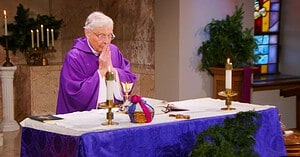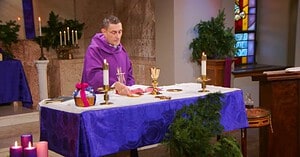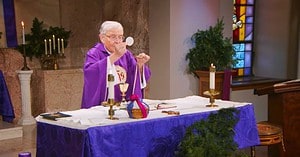Third Sunday in Ordinary Time
Homily Video
Third Sunday in Ordinary Time Homily Transcript
>>Ezra was actually a quite significant figure historically in the history of Israel. So, Ezra is a priest scribe after the Babylonian exile right –or right at the end of the Babylonian exile. Sothink about like 550 B.C. or so. The Babylonian exiles, of course, when the Babylonians come down from what is modern day Iraq and they destroyed Jerusalem, they destroy the temple, they kill a million Jews, and they they take a remnant of the Jewish faithful into exile in Babylon. Where they’re there for about 70 years. Well, at the end of this time, what happens is the Babylonians are conquered by the Persians and then the king of Persia, Xerxes allows the Jews to go back, and he allows actually the temple to be rebuilt. And the first thing Xerxes does is he sends Ezra, this Jew in exile, back to Jerusalem to teach the law. And so, Ezra is a professor of law, if you will. Now, the law is so significant to the Jewish people, especially with the exile, because this is how they identify themselves as a Jew by following the law. With the Babylonian exile and the destruction of Jerusalem in the sixth century, to be a Jew is no longer to be nationally identified because you have the Diaspora, they’re all spread around all over the the Middle East. So it’s not just I’m a Jew, if I’m an Israelite, because Israel’s gone. You have Jews in Egypt, you have Jews in Syria and Babylon, so it’s no longer a national identity from which one identifies himself or herself. It’s no longer cultic temple worship. So, I’m a Jew because I do “x-y-z” in the temple because the temple has been destroyed. So to be identified as a Jew means you follow the law. And so, the law is really an important part of Jewish identity, and this is what Ezra teaches the people in our gospel. He stands up on this wooden platform and he preaches all morning -teaching the people how to follow God. And so what you have in the history of Jerusalem now is the rise of the synagogue. The synagogue is basically a law school, and so synagogues pop up all over the Middle East. And this is where Jews gather in their town. And the rabbi is the teacher of the law, the teacher of the Torah in the line of Ezra. So it’s no longer again everything has to go down in Jerusalem, in the temple. You have these satellite campuses or law schools, synagogues. And that’s why when Jesus, at the beginning of his ministry, he’s the-he’s the Messiah. He’s the son of God, son of David. Where does he go first? Into the synagogue andhe teaches. And he goes back, in fact, to his hometown in Nazareth, in the synagogue locally and he teaches the law. He gives, he unrolls the scroll of the prophet Isaiah. And he shows the people how, ‘Okay, this has been prophesied and I’m the fulfillment of this prophecy.’ So why do I talk about this stuff? ‘Yeah, interesting history, Father James, we’re about to go to sleep on Sunday morning. Do your lesson here.’ But why? Because the law is a significant part of our church. You know, we are a continuation of Israel, we’re the new Jerusalem. And so, to be a Christian people is a people that both loves God and we love our neighbor and we’re inspired by the spirit to do spontaneous things. But we’re also people that they have to know our history and we have to know our law and we have to follow our law. Not that we’re slaves to the law, but the law is always meant to lead us closer to Jesus Christ. So maybe a fun spiritual exercise that you can do today is to think of a law in the church that you don’t particularly like. Okay. I can name a few of them myself. Anything from fasting on a Friday in Lent, not eating meat, to fasting an hour before communion, whatever it might be, or some social justice or some moral law that you just don’t really like. Think about that law and make praying with that law an act of surrender to God. You might not like it, but try to follow it. And in following it, what you’re doing is you’re loving God and you’re again devoting yourself to Jesus Christ, and you’re surrendering and you’re trusting in him. It’s not so much the law that matters, but ultimately your soul and again, your surrender and trust in Jesus Christ. Amen.
Readings
First Reading:
Neh 8:2-4a, 5-6, 8-10
Second Reading:
1 Cor 12:12-30 or 12:12-14, 27
Gospel:
Lk 1:1-4; 4:14-21 (69)
Featured Text
You can now listen to Sunday Mass in podcast form:
Discover More
Third Sunday of Advent
December 15, 2024
Second Sunday of Advent
December 8, 2024
First Sunday of Advent
December 1, 2024
Request Sunday Mass Guide
The Sunday Mass Guide sent to your home address
Spiritual nourishment and updates from the Sunday Mass community
Monthly reflections from Fr. Scott Donahue, our Principal Celebrant


